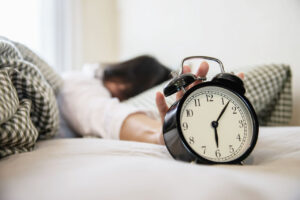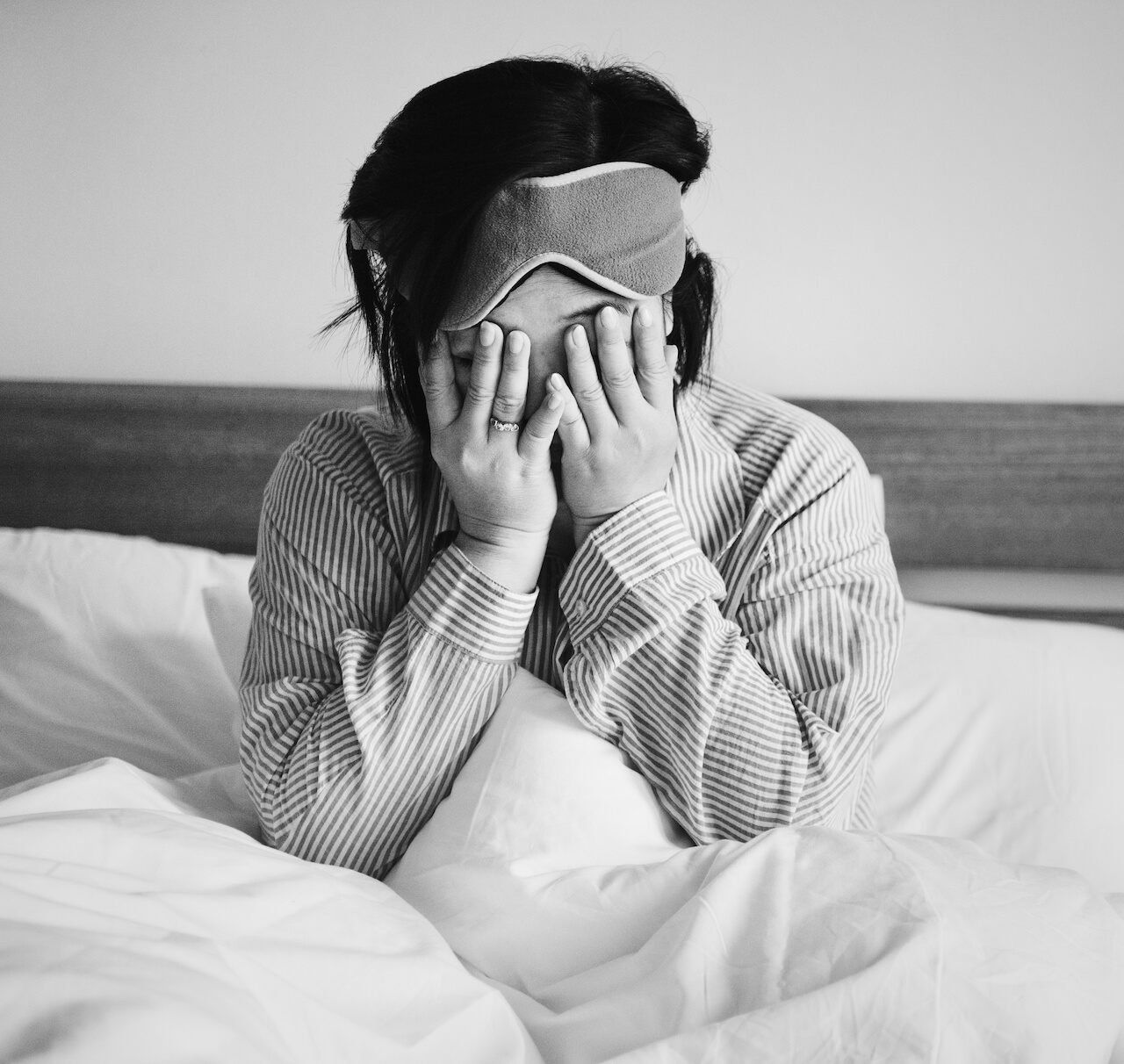What is the secret to good sleep? We have many problems associated with sleep – lack of sleep, constant sleepiness and fatigue, daytime sleepiness, not being able to fall asleep at night, and sleep that is intermittent. It is true that in an ideal world, our sleep rhythm would be in sync with the sunrise and sunset. Otherwise, sleep deprivation can easily occur. Unfortunately, this is not always possible. Work obligations and taking care of children can make it quite difficult to achieve such a rhythm. Not to mention the “charms” of living in the Nordic countries, where the days are long and the nights are short in summer and vice versa in winter.
If you can't go to bed early, at least make sure that your sleep duration is correct and regular. Good sleep is up to each of us.
Determine how many hours of sleep you need and match it to a time that you can use most consistently for sleeping and that coincides with the darkest hours as much as possible. Preferably in the earlier rather than later hours of the night.
How many hours of sleep do we need?
Sleep cycles – how to wake up refreshed?
Sleep phases – not all sleep is created equal
What is the circadian rhythm and how does it work?
Side effects of sleep deprivation
Side effects of excessive sleeping
Why is earlier better?
Summary – Remember
What is sleep? How many hours of sleep do we need?
What is a reasonable amount of sleep? Scientists have agreed in sleep recommendations, according to which an adult needs 7 to 9 hours of sleep per night. Newborns, children, teenagers and young adults need even more sleep to grow and develop. People over 65 need 7 to 8 hours of sleep per night, and their sleep time is slightly shorter.
So what time should you go to bed? Always at a time that allows you to get the full amount of sleep you need for your age.
Take the time you have to get up in the morning to go to work or school as a basis and calculate the hours of sleep you need from there, adding another 0.5 hour for falling asleep.
For example, if you have to get up at 6:00 AM and need 8 hours of quality sleep, you should go to bed no later than 9:30 PM, or 8.5 hours before your alarm clock.
It's important to find a sleep routine that you can stick to every night, even on weekends. Staying up late on weekends and sleeping in early will disrupt your sleep rhythm and make it harder to get back on track.
This brings us to another important topic, which is the regularity of sleep and sleep time.
Sleep cycles, REM sleep – how to wake up refreshed?
There is often talk about a lack of deep sleep. Sleep is of two types: different kinds, REM sleep and non-REM sleep. The former refers to restless sleep, where our eyes move under our eyelids. The latter is further divided into three phases. So, in total, four phases of sleep are distinguished, which alternate in a specific rhythm during a typical night.
Ideally, an adult should go through these sleep phases about five times a night, or five cycles. The duration of the sleep phases changes as the night progresses, but in total, one cycle lasts about 1.5 hours.
It is useful to know the length of your sleep cycle and take it into account, for example, when choosing a bedtime or wake-up time. Namely, it is easiest to wake up during REM sleep, which is the last phase in each cycle. Therefore, choose a time to go to bed that allows you to wake up during REM sleep.
For example, you've rewarded yourself with a nice vacation, but alas, you have to wake up at 4 a.m. to catch your flight. Instead of setting your alarm for 4 a.m. and going to bed at your usual time, it's much more sensible to do some math.
If you start moving forward 1.5 hours from the time you wake up, in this case from 4:00 a.m., you can fit about three sleep cycles between 10:30 p.m. and 4:00 a.m. You should allow up to 30 minutes for falling asleep, so if you go to bed at 10:00 p.m., waking up at 4:00 a.m. should be significantly more humane than, for example, crawling into bed at 11:00 p.m.

In order to sleep more than three cycles in this example, you need to go to bed even earlier. For four cycles, you should go to bed at 8:30 p.m., etc. To make this part of the math easier for people, there are also several helpful smartphone apps that do this calculation themselves and, if necessary, fill in the alarm clock part.
I've been using phone apps to help me track my sleep for years. They're especially helpful when you have to wake up at an unusual time. And the less time you have to sleep, the more important it is to not interrupt your sleep before the end of the cycle. One or two sleep cycles are much better than half a cycle or none at all.
Sleep phases – not all sleep is created equal
Scientists have found by studying brain waves that in the early stages of sleep, we are actually quite awake. Our eyes may still be open, but our brains are already preparing for sleep. If no one disturbs us, we fall asleep deeper, our brain waves slow down, and we fall into a deeper sleep.
First phase
The first stage of sleep is the transition from wakefulness to sleep. This is the moment when you begin to slowly drift off. Beta waves take over the brain, focus becomes blurred, and the eyes begin to close. If you wake a person up during this stage, they may not realize they were already fast asleep.
Sleep researchers point out that in the first stage of sleep: the brain slows down, heart rate, eye movement and breathing also slow down, muscles relax and unexpected twitches or jerks may occur.
This transition phase from wakefulness to deeper sleep lasts about 5–10 minutes, judging by brain waves. So if it takes you significantly longer than that while in bed, you're either not ready to go to sleep yet or you're doing something that's preventing you from falling asleep.
Second phase
This is the phase of sleep in which, according to American sleep researchers, we spend half of your sleep timeThis phase lasts 10–60 min, being shorter in the early hours of the night and lengthening as morning approaches.
As we enter this phase, our awareness of our surroundings decreases, making us more difficult to wake than in the first phase. Body temperature drops, eye movement stops, breathing and heartbeat become more regular. This phase also involves the processing, organization and storage of our memories from the previous day.
Stage Three – Deep Sleep
The third stage of sleep is characterized by even slower brain waves, called delta waves. It is very difficult to wake someone up in this stage, and if you do, there is no point in expecting much gratitude. That is, of course, unless the room is on fire. If you constantly have problems with not hearing your alarm clock or feeling very groggy when you wake up, then reread what I wrote above about sleep cycles.
During this phase of sleep, our muscles are completely relaxed, blood pressure drops, and breathing slows down. You are in the deepest phase of sleep, where your body can initiate the necessary repair processes, including strengthening your immune system. At the same time, your brain can store factual knowledge that you have learned.
Stage 3 lasts about 20–40 minutes, but unlike the lighter stages of sleep, deep sleep is longer in the early hours of the night and shorter as the morning approaches. The earlier you go to bed, the more you will hopefully spend in deep sleep during the night and wake up more rested in the morning.
Based on personal observations, I have noticed that if bedtime is postponed until the new day, the senses are overly excited, or the stomach is too full, then deep sleep may not be achieved, or when the body finally calms down towards morning and the expected deep sleep arrives, it is already time to wake up, and as mentioned, waking up from deep sleep is not a particularly pleasant experience.
Stage Four – REM Sleep
The last phase of each cycle is REM sleep, where our brains become active again. Brain waves in this phase are most similar to those that occur during wakefulness. While there is some activation in the brain, the limbs become immobile. It can be quite a frightening experience when consciousness begins to quietly awaken and you feel like you can't move your arms or legs. This is completely normal and there is no reason to worry.
The first phase of REM sleep usually begins 90 minutes after falling asleep and lasts 10-60 minutes, depending on the time of day and other circumstances. REM sleep phases become longer as morning approaches.
Memory-related processes also occur in the brain during this phase. Scientists believe that during REM sleep, processes and stores memories related to emotions in the brain.
Order of sleep stages
When we sleep, we don't go through these four stages in order. Assuming we are not disturbed and can sleep peacefully, the order of the sleep stages is as follows:
- Sleep begins with the first phase
- The second stage, or light sleep
- The third stage, or deep sleep
- The second stage, or light sleep
- REM sleep
After REM sleep, we don't go back to stage 1, but immediately move on to stage 2. Normally, we would go through four to five cycles each night, or in other words, 7–9 hours.
What is the circadian rhythm and how does it work?
Circadian rhythm is a term used to describe the brain's natural sleep-wake cycle. It's like our internal clock.
We all have periods of time during the day when we are sleepier and periods when we are more alert. People are usually sleepiest between 1:00 PM and 3:00 PM and 2:00 AM and 4:00 AM.
The better the quality of your nighttime sleep, the less you will feel sleepy during the day. However, daytime sleepiness indicates sleep deprivation.
The circadian rhythm also controls your bedtime and wake-up times. If you go to bed and wake up at the same time every day, your brain gets used to it and you can sleep at night without any problems and wake up in the morning without an alarm clock. Provided that the quality of your sleep is good.
However, if you work irregular shifts or go to bed at different times throughout the week, your circadian rhythm will be thrown off balance. This can cause daytime sleepiness and worsen sleep quality.

Side effects of sleep deprivation
Daytime sleepiness is a sign that you are not getting enough sleep at night. Disrupted sleep and lack of deep sleep affect our health. Symptoms of sleep deprivation include accidents, irritability, and forgetfulness.
Disrupted sleep and chronic sleep deprivation can also lead to long-term health problems. For example, frequent illness, high blood pressure, diabetes, heart disease, obesity, and depression, to name just a few health risks. If you are constantly tired and sleepy during the day, the reason may lie in your health condition, not in the length and quality of your sleep.
The side effects of sleeping too much are similar to those of sleep deprivation
The side effects of sleep deprivation have long been known and studied, but so have the health risks associated with excessive sleeping.
If you consistently need more sleep at night than your age-based recommendation suggests, and you may also need to take naps during the day, there is reason to suspect that your sleep quality is not up to par.
Excessive sleeping has several side effects that are similar to sleep deprivation, such as depression, irritability, and cardiovascular disease.
However, these health problems may not always be caused by too much sleep or poor sleep quality. Excessive sleep needs can also be linked to a number of health problems.
Some examples of health conditions that can cause excessive sleepiness or disrupt sleep include: anxiety, depression, sleep apnea, Parkinson's disease, diabetes, heart disease, obesity, thyroid disorders, and asthma.
Why is earlier better?
Culturally, it is quite common to stay up until midnight or even later. There can be many and very different reasons for this.
Who wants to have a long evening of entertainment or consume culture, who needs to catch up on work or schoolwork? If you also happen to have a family and children, it is even more difficult to fit everything you need into your free time.
Since most people's wake-up time is dictated by school or work, it seems like there's nowhere else to grab extra time than in the evening hours.
In fact, in many cases, it is entirely possible to accustom yourself to an earlier bedtime and wake up earlier in the morning.
For example, as a parent, you put your children to bed at 9:00 PM and sleep through the night yourself, so you can get up at 5:30 AM and do your necessary chores in the quiet hours of the morning.
I know that the idea of going to bed earlier and getting up earlier may seem foreign, not to say utopian. But I will present some arguments that support going to bed earlier.
Benefits of going to bed and waking up earlier:
- Studies show that "larks" have a lower risk of heart disease and diabetes and a longer lifespan compared to "owls."
- "Larks" have a more regular and healthier eating pattern (a proper breakfast and fewer evening snacks), which ensures a stronger immune system and fewer illnesses, better daytime mental performance, and lower stress levels.
- Fewer sleep problems and better quality sleep. In the early hours of the night, the deep sleep phases are longer, shortening as the morning approaches. This way you sleep deeply and wake up easily. When you go to bed after midnight, this pattern is reversed. Sleep begins with short cycles of light sleep, which only become deeper towards morning, when you have to get up. This way, much of your sleep is light and shallow, and the alarm tends to go off just when you have finally reached the deep sleep phase, from which it is difficult to wake up.
- Better sleep chemistry. Most people have their endogenous melatonin levels highest in the early hours of the night. The higher the melatonin levels, the better the sleep. Staying up late and sleep deprivation affect ghrelin levels, which can lead to obesity. Ghrelin is the hormone that regulates our appetite. The release of ghrelin in the first few hours of sleep is correlated with higher levels of growth hormone, which renews cells and tissues, keeping our bodies healthy.
Summary – Remember
In general, it's better to go to bed earlier and get up earlier in the morning. However, if this doesn't fit into your lifestyle, don't despair.
Make sure you get enough quality sleep every day. To achieve this, it is important to establish regularity, going to bed and waking up at the same time every day.
If you have difficulty falling asleep or are constantly sleepy during the day despite getting enough sleep and staying regular, this may be a sign that your sleep quality is not adequate. In this case, consult a sleep specialist for help.

Allan Randlepp
NutritionistAllan is a nutritionist and trainer whose favorite topics are lifestyle and longevity, including nutrition and physical activity.
Chronic Inflammation and Anti-Inflammatory Foods





